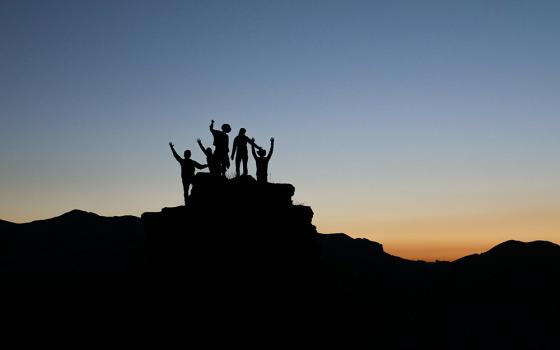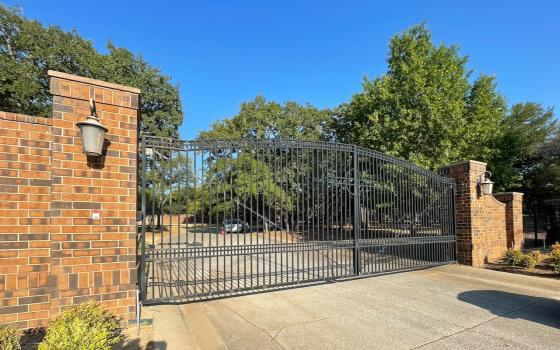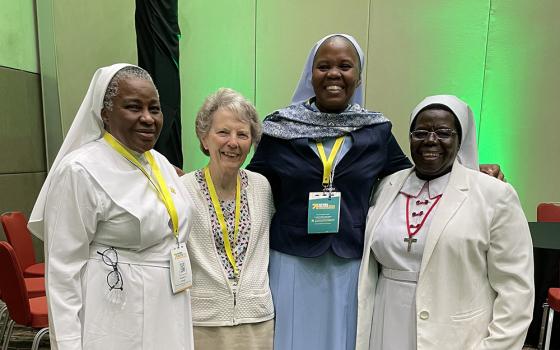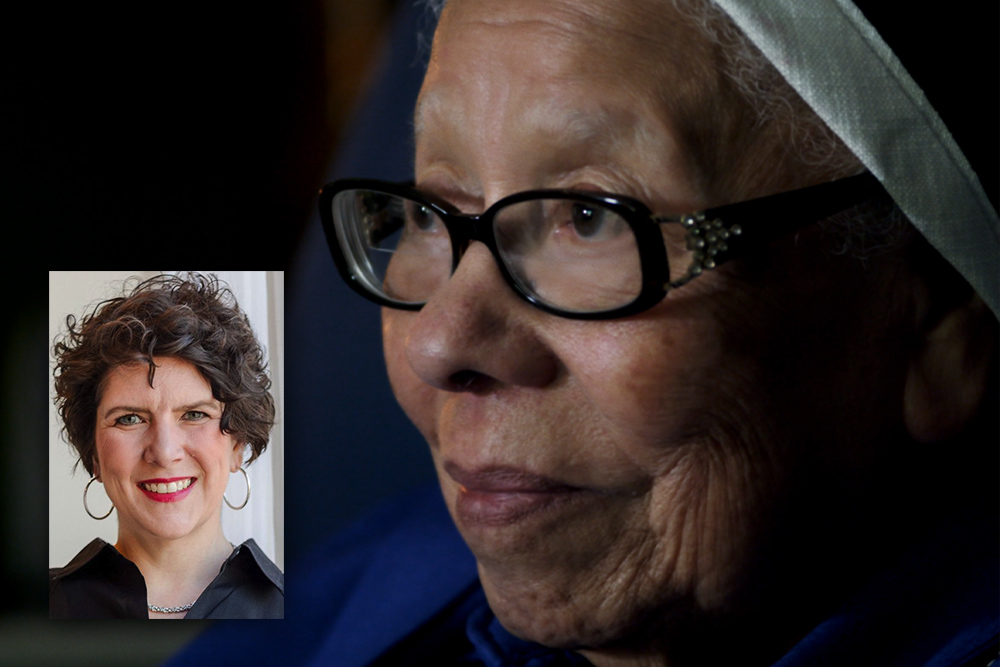
Sr. María Rosa Legoll of the School Sisters of St. Francis in the documentary "With This Light"; inset: Nicole Bernardi-Reis, producer and co-director of the film (Photos courtesy of Miraflores Films)
About two years ago, my friend Nicole Bernardi-Reis emailed to ask for my feedback on a rough cut of her new film, "With This Light," which chronicles the extraordinary life of Sr. María Rosa Legoll of the School Sisters of St. Francis. Nicole is the producer and co-director of this award-winning documentary, which premiered in Los Angeles, Chicago and New York. It was also featured at the 2023 Parliament of the World's Religions in Chicago in August.
The film is now available to rent or buy on Amazon Prime Video, YouTube, Apple TV+ and other services.
I first met Nicole when she produced "Radical Grace," another award-winning film. I was featured in that one and I loved her Gen X curiosity about God, faith, and the faith life of women. We quickly became friends.
Often called the "Mother Teresa of Honduras," Sister María Rosa founded schools, orphanages and job training programs throughout her beleaguered country. She was especially passionate about educating girls and young women who are regularly preyed upon by machismo men.
When she died in 2020 at the age of 93, she had served an astounding 87,000 Honduran children.
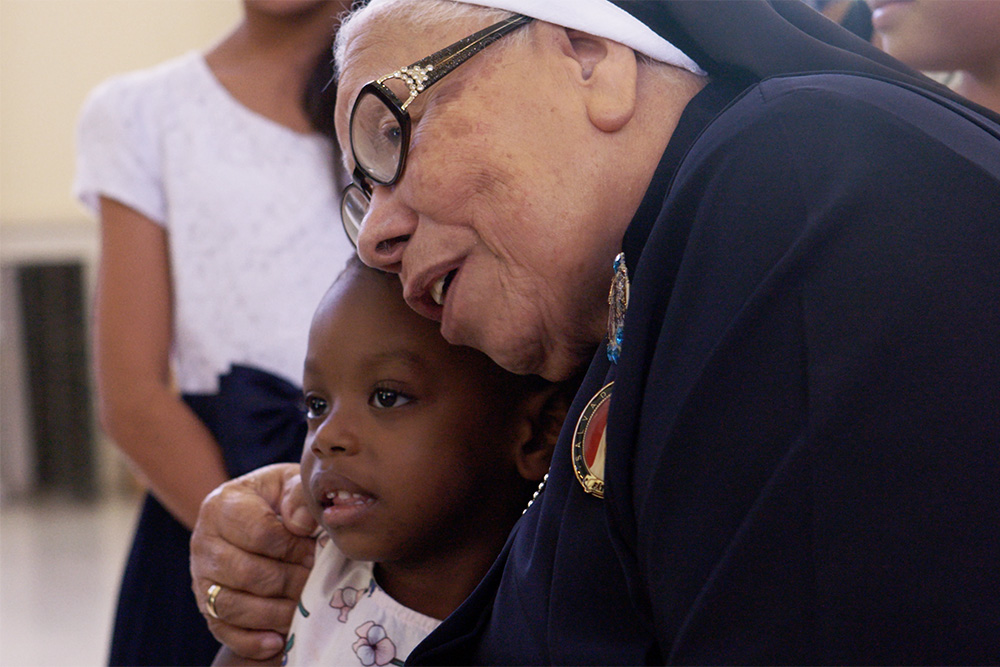
Sr. María Rosa Legoll of the School Sisters of St. Francis hugs a child in the documentary film "With This Light." (Courtesy of Miraflores Films)
Today, tens of thousands of Hondurans are better equipped to care for themselves and their families because of the vision of a woman who had only a fifth grade education.
In 2021, Pope Francis — who had never before heard of Sister María Rosa — viewed a trailer of "With This Light." Responding to widespread pleas from Hondurans, he agreed to open the process for her beatification.
This film is clearly a labor of love, yet I decided to leave critical reviews to others.
Instead, I interviewed Nicole herself. I hoped to discover how and why this Gen X seeker chose to spend five years of her life making a film about a relatively obscure nun. Here are excerpts from our interview:
Schenk: How did you get involved in this project?
Bernardi-Reis: I was at a crossroads. I had a number of projects that didn't work out and I had one of those moments of, you know, "Ask God, ask the universe, for what you want." I literally shook my fist in the air, Chris, I was so frustrated. And I said, "If I'm supposed to do this, you need to show me that I'm supposed to do this." And the phone rang.
Advertisement
It was Jessica Sarowitz, the executive producer of "With this Light." [Sarowitz is also the founder of Miraflores Films, a social impact investor and an entrepreneur.] Born in Honduras, Jess moved to Chicago at age 3 with her parents. I met her in Chicago. She first met Sister María Rosa when she was only 8, on one of her family's frequent trips to Honduras to help.
Jessica knew that Sister's time was short, and so she called me. She said, "I think that Sister is in, I think there's a movie here."
I didn't know who Sister María Rosa was, which is kind of mind-boggling from somebody who is a little bit of a self-professed nun junkie. And so I went down for a whirlwind trip. In four days, we saw all these projects and I met her. She was amazing.
What was it like to film Sister María Rosa?
She's like a spiritual lightning rod. But she's also one of the most funny, rascally, troublemaking people. A lot of humor.
What I loved about her is that she was so human. You know, you think that nuns are just about holiness because you've devoted your life to God. But she was also so, so human.
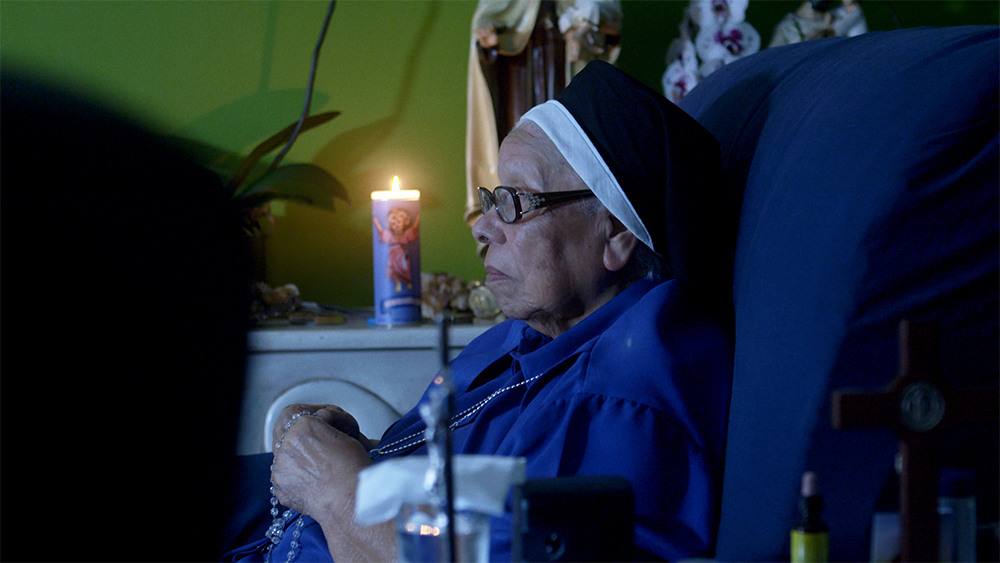
Sr. María Rosa Legoll of the School Sisters of St. Francis watches soccer in the documentary film "With This Light." (Courtesy of Miraflores Films)
Can you talk a little more about her being like a spiritual lightning rod?
She had a way of almost seeing into you. That sounds so corny. At least for me — and I've talked to other people about it — it felt like somebody was seeing you for the first time. She had that ability.
She also had this really great knack of being very clear about what you needed to do. And not in a weird manipulative way, but just being like, "I see you." When you feel like somebody sees you for who you are and loves you for who you are, things just become clearer for you.
What was it like to film Hondurans in Sister María's ministry network?
It was just amazing to see how many people have been with her for such a long time. ... They love doing the rosary. They're very devout Catholics. And not just in terms of the ritual, but also in terms of the work — getting up every day and ministering to people as equals.
And Sister María Rosa loved everybody. She used to say, "I want to take everybody to heaven."
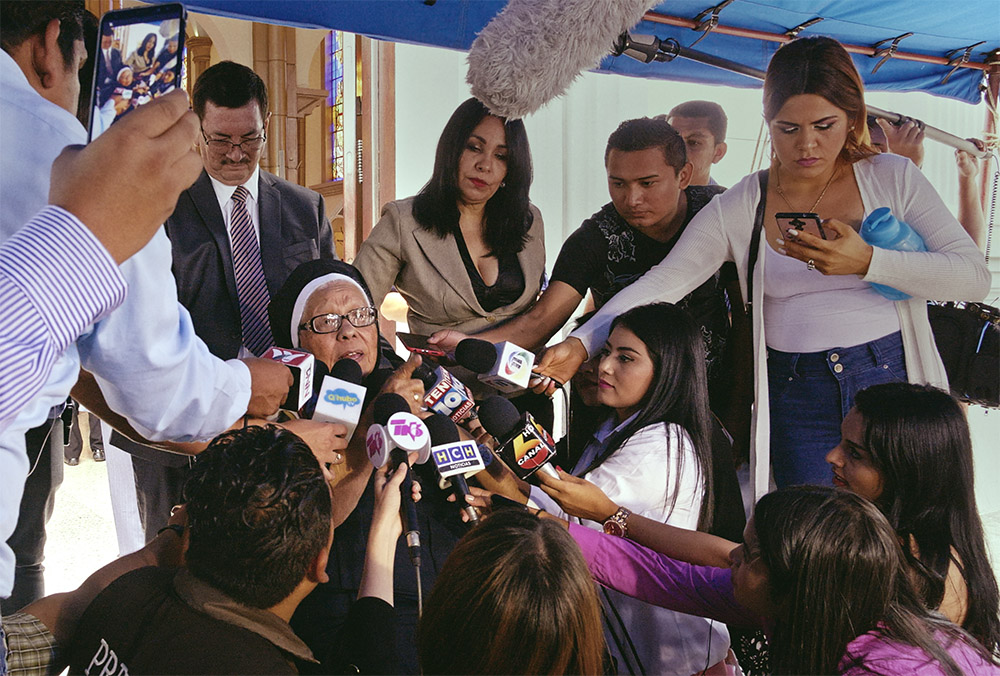
Sr. María Rosa Legoll of the School Sisters of St. Francis speaks during a press conference in the documentary film "With This Light." (Courtesy of Miraflores Films)
At the end of the film, we have some examples of the people that have gone through her programs. And when you look at what they've done, it is just amazing. They own their own businesses. Some work in government. Lots of people are in medicine because one of the things she did was to bring medical attention to people in different communities.
What were the best parts of creating this film? What especially touched you?
The coolest thing for me was understanding the scope of her work. This woman — who had been an orphan with a fifth grade education — could create more innovative programs than a lot of those taught in Harvard Business School.
And it all was because of a belief — not necessarily in herself. No, she would always say, "María Rosa is nothing, but María Rosa plus God can do anything."
Also meeting these young women and seeing that Sister was creating a program for the whole person. ... She believed people should have two or three different skills so they could always take care of their family. But she also made sure that there is play time. Children learn how to play instruments. Life isn't just about working.
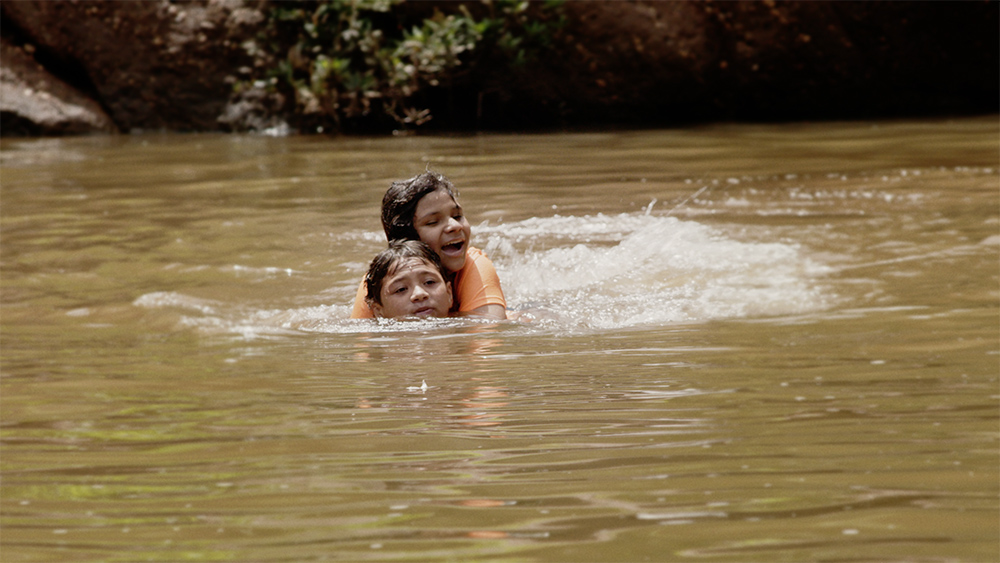
Honduran teenager María swims with her brother in the documentary film "With This Light." (Courtesy of Miraflores Films)
What were some of the most challenging parts of making the film?
The hardest thing for me was really seeing how dangerous it is for women who live in poorer neighborhoods down there. It's one of the countries with the highest rate of femicide. It was really dangerous for María [a central film subject] to walk the two hours to get to school once a week.
The girls' interviews were so sensitive that basically everybody would leave the room except for Carlo [Herrchen], my sound engineer, and Laura [Bermúdez], the co-director. And both sat there and listened to them tell these stories about just horrific abuse. That was the biggest, most serious challenge.
We were mostly a female crew. It's really important to have women-led teams [that] create a place where people can feel safe to tell their stories. And for those young women, no one had asked them about their lives.
But the converse was seeing how Sister María Rosa was always trying to find ways to holistically help people. How can I get jobs? What can I do to make people's lives better and give them dignity and give them opportunity?
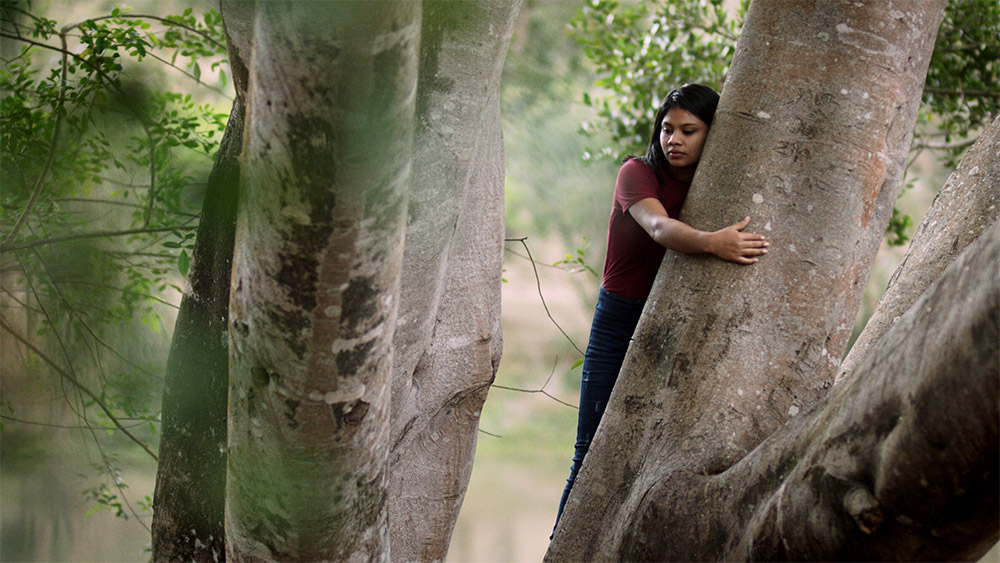
Rosa, a Honduran teenager featured in the documentary film "With This Light" (Courtesy of Miraflores Films)
Reyes Irene, [a school for girls in Tegucigalpa] teaches gender equity, and girls at Reyes learn about female reproductive health. Sister got a lot of flak for that [but] the thing that gets frustrating is that we're trying to navigate this journey of faith and we all live in a real world. And young women from poor neighborhoods in Honduras need a way to not get pregnant.
For a lot of the girls, it's not their choice. They are literally getting snatched off the street by these men who are then claiming them as their own.
What did making this film mean to you?
To create something powerful enough to change the world, it has to change your life. So, for me, it's been really exciting to get in touch with being Catholic again in terms of just helping to create more space for women's voices. It's very hard, I think, for [Catholic] women to see what our spiritual birthright is sometimes.
To have the opportunity to show women's faith in action has always been something I find very renewing. When I was doing film festivals at "Radical Grace," people would come up to me and they would hug me afterwards, crying, and say they felt like it was so healing. And men would do it, too.
How can people help?
First and foremost, I hope people see the film. Starting Aug. 15, viewers in the United States and Canada can find it on various digital platforms such iTunes, Google Play and others. People can also do community screenings. For example, the website has possibilities for book club screening or a church group screening.
I hope they will be inspired to help continue Sister María's work in Honduras. If that's not what they are called to do, I hope they find a way to do some good in their own communities.
With this film, I hope Sister María's message about loving everybody is something people can take into their heart and use to propel their own work forward.

